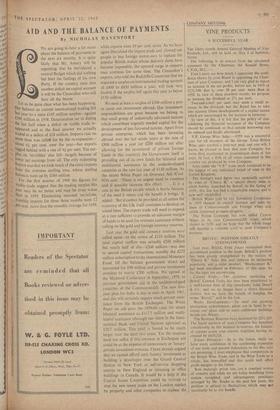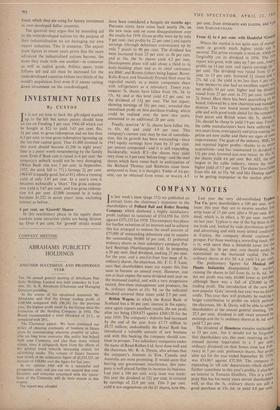AlD AND THE BALANCE OF PAYMENTS
By NICHOLAS DAVENPORT
WI: are going to hear a lot more about the balance of payments in the next six months. It is quite likely that Mr. Amory will be regretting that he introduced a neutral Budget which did nothing but hurt the feelings of his own Party. If the country runs into another deficit on capital account it will be the Chancellor who will bear all the blame.
Let us be quite clear what has been happening. Our balance on current international trading fell last year to a mere £145 million surplus—against 049 million in 1958. Deterioration set in during the last half when a deficit on visible trade re- 413Peared and in the final quarter we actually traded at a deficit of £18 million. Imports rose no more than was called for by the re-expansion- 13°111 6-1 per cent. over the year—but exports lagged behind with a rise of 4 per cent. The sur- Plus on 'invisibles' also fell—largely because of 1°wer net earnings from oil. The only redeeming feature was that we took much of the extra imports from the overseas sterling area, whose sterling balances went up by £184 million.
For the first quarter of 1960 the figures for visible trade suggest that the trading surplus this Year may be no better and may be even worse than in 1959. Eliminating seasonal variations, Monthly imports for these three months were 12 Per cent. more than the monthly average for 1959.
while exports were 10 per cent, more. As we have again liberalised the import trade and illowed our people to buy foreign motor-cars to replace the popular British makes whose delivery dates have become impossible, the upward surge in imports may continue for some time. The Chancellor's experts, who told the Radcliffe Committee that we required a surplus on international trading account of £400 to £450 million a year, will look very foolish if the surplus fell again this year to below £150 million.
We need at least a surplus of £300 million a year to cover our investment abroad. Qur investment responsibilities are great because we belong to that small group of industrially advanced nations which contribute urgently needed capital for the development of less favoured nations. Apart from private enterprise, which has been investing abroad over the last seven years at the rate of £300 million a year (or £200 million net after allowing for the investment of private foreign funds in this country), the Government itself is providing out of its own funds for bilateral and multilateral assistance to the underdeveloped countries at the rate last year of £138 million. As the recent White Paper on Overseas Aid (Cmd. 974) said : 'There is an urgent need to continue and if possible increase this effort. . . . It is a cost to the British people which is borne because of the need it meets and the benefit it brings.' It added: 'But it cannot be provided at all unless the economy of the UK itself continues to develop on sound lines. The export trade will need to expand at a rate sufficient to provide an adequate margin of funds to be used for overseas assistance without calling on the gold and foreign-Currency reserves.'
Last year the gold and currency reserves were called upon—to the extent of £119 million. The total capital outflow was actually £548 million but nearly half of this--£260 million—was due to special capital transactions, notably the £232 million subscription to the International Monetary Fund. Of the balance government direct aid accounted for £90 million and private investment overseas to nearly £.200 million. We agreed at the Montreal Conference in September, 1958, to increase government aid to the underdeveloped countries of the Commonwealth. The new five- year plan for India is due to start in April. 1961, and this will certainly require much greater assis- tance from the British Exchequer. The White Paper on aid gave the 1959-60 total for direct bilateral assistance as £117.7 million and multi- lateral assistance (through our share in the Inter- national Bank and United Nations agencies) as £20.7 million. This total is bound to be much larger over the next two years. Yet the reserves need not suffer if this increase in Exchequer aid could be at the expense of unnecessary or 'luxury' private investment overseas. I have already argued that we cannot afford such 'luxury' investment as building a skyscraper over the Grand Central Station in New York or self-service shopping centres in New England or investing in office buildings in Canada. It would be a help if the Capital Issues Committee could be revived to stop the new issues made on the London market by property and other companies to replace the funds which they are using for luxury investment in over-developed dollar countries.
The ignorant may argue that by extending aid to the underdeveloped nations for the purpose of their industrialisation we are damaging our own export industries. This is nonsense. The export trade figures in recent years prove that the more advanced the industrialised nations become, the more they trade with one another-in consumer as well as capital goods. Politics apart, trade follows aid and aid must be increased for the underdeveloped countries (where two-thirds of the world's population live) even if it means cutting down investment on the overdeveloped.











































 Previous page
Previous page